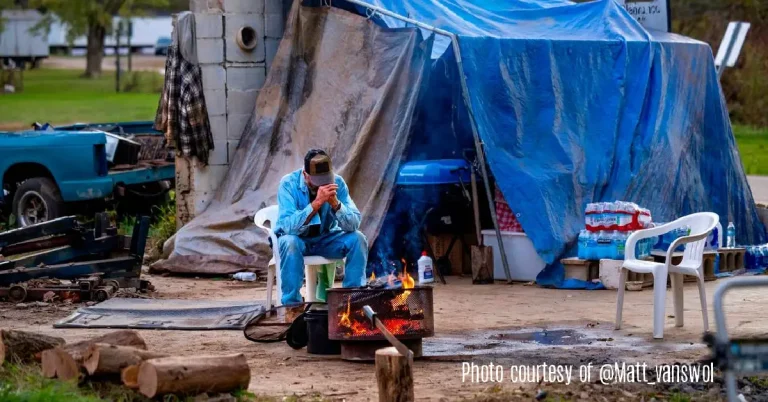Some of the links in this post may contain affiliate links for your convenience. As an Amazon associate I earn from qualifying purchases.
Sometimes in life, we find ourselves in situations of extreme stress where it seems like we are dealing with one crisis after another–job loss, expensive car and home repairs, appliances breaking down, medical emergencies, and so on. Many of us have been in circumstances like this, only to look up and suddenly realize there is a NEW crisis: money, or lack thereof.
Suddenly, savings accounts have run dry, credit cards are maxed out, debt is accruing rapidly, but your kids still want to know what’s for dinner tonight.
In dire cases like this where there is no longer a financial cushion for you to fall back on, then it’s time to consider every possible avenue of boosting your income you can. That includes diving deep for ways to be more frugal. In this article, we’ve got extreme frugality ideas to help you weather this very difficult season.
Frugality seamlessly combines with preparedness, including more than just financial management. Adopting a frugal lifestyle involves nurturing a mindset of resourcefulness, building resilience against unforeseen challenges. Through intentional spending, saving, and budgeting, you can create a financial safety net for unexpected situations.
Beyond finances, the frugal mindset promotes resourceful daily living, minimizing waste and enhancing self-sufficiency. This holistic approach transforms frugality into a comprehensive preparedness strategy.
It also positions you better for when life keeps hitting you when you’re already down. In a season like that, you need tips like these to help you be extremely frugal.
11 Extreme Frugality Tips
- Look into any and all Social Security programs that may be available to you (SSI, Medicaid, food stamps, etc.). Government authorities are not very generous when it comes to financial aid, but every little bit of help counts when the situation is desperate. Which leads into tip #2…
- When reporting your circumstances to federal agencies or other authorities, describe your worst days, not your best–don’t lie, but do emphasize heavily how dire your situation is. Federal agencies have strict cut-offs for who they will and will not help, so make sure to familiarize yourself with their general policies before seeking help through them.
- Be ruthless when cutting expenses for wants vs. needs, and sell whatever you can. Is Netflix really a need? What about any subscriptions you have going? If you have multiple cars in your household, do a serious assessment of whether all of them are truly needed. You could easily get a few thousand dollars if you sell one of them.
- Seriously consider job-searching for something better-paying. The job hunt is NO fun and can be time-consuming, but seeking more lucrative employment is an obvious way to try to increase household income. Or, add a second part-time job on top of what you already do. Apps like Rover can connect you with people who need pet-sitting. Or try Uber, Lyft, Doordash, Favor, or any other job where you have the ability to set your own hours. Lastly, many companies look for part-time remote employees (such as Walmart, United airlines, and others). Read this post for ways people earned money during the Great Depression. You might glean some ideas.
- If other members of your household can work, then encourage them to find jobs and help contribute to expenses where they are able. (e.g. A 14 year-old who works at Chick-Fil-A obviously can’t help with big utilities expenses, but they can pay for and cook dinner a few times a month. Earning their own money will also enable them to pay for their own clothes, haircuts, snacks, etc.)
- File for bankruptcy and cut your losses if debt is accruing too rapidly for you to get a handle on. It is an incredibly difficult and painful decision to make, but sometimes it is best to just start fresh.
- Go through each monthly expense and see what can be canceled. Very often, TV streaming services, cable TV and cell phone companies will negotiate a lower price with you to avoid a cancellation. Here is some guidance to help in reducing household expenses.
- Amazon Prime is only $6.99 per month for people who receive food stamps or other types of assistance. This would give you access to Amazon Prime streaming with thousands of movies and TV shows for a very low price. Also, you can use foodstamps to purchase some foods on Amazon. Do a search for products that are eligible for food stamp purchases.
- YouTube is free and has TV episodes and movies available.
- All states have an Assisted Connectivity Program. If anyone in your household receives SNAP, Medicaid, or SSI, you can get a $30 discount on internet services.
- Consider supplementing your food storage with items, such as fresh produce, from local food banks or church food pantries. It might require swallowing your pride, but it’s important to maintain your health and good nutrition is key.
Above all, never be afraid to ask for help or reach out to available resources. Most people need a hand up at least once or twice in their lifetime. Help is available; just ask. Next time around, you might be the one with more than enough to share.
Remember Self-care
In the midst of these challenging times, remember that you’re not alone. Life’s unexpected crises can feel overwhelming, and it takes incredible strength to navigate through them.
Amidst the chaos, try to find moments of gratitude. It may seem like a small thing, but acknowledging even the tiniest blessings can shift your perspective. The ability to share a meal, the warmth of your home, the support of friends—these are treasures that often shine brightest in tough times.
Consider embracing a spirit of generosity, not only towards others but also towards yourself. Generosity is a balm for the soul. It can be as simple as offering a kind word to someone else or extending compassion to yourself in moments of struggle. It’s a reminder that we’re all connected, and together, we can endure.
Remember, your mental and emotional health matter just as much as your financial well-being. Take moments for self-care, whether it’s a quiet walk, a few deep breaths, or finding solace in a good book. You’re resilient, and this challenging chapter will pass.
Lean on your support system—friends, family, or even a kind neighbor. There’s strength in unity, and people genuinely want to help. Sometimes, opening up to others not only lightens your burden but also creates space for the beauty of human connection.
You’re stronger than you realize, and brighter days are ahead. Keep moving forward with hope in your heart.
















